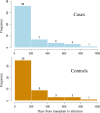Temporal trends, risk factors and outcomes of infections due to extended-spectrum β-lactamase producing Enterobacterales in Swiss solid organ transplant recipients between 2012 and 2018
- PMID: 33678189
- PMCID: PMC7938519
- DOI: 10.1186/s13756-021-00918-7
Temporal trends, risk factors and outcomes of infections due to extended-spectrum β-lactamase producing Enterobacterales in Swiss solid organ transplant recipients between 2012 and 2018
Abstract
Background: The burden of antimicrobial resistance is high in solid organ transplant (SOT) recipients. Among Swiss SOT recipients, we assessed temporal trends of ESBL-producing Enterobacterales (ESBL-E), identified risk factors for ESBL-E, and assessed the impact of resistance on patient outcome.
Methods: Data from the Swiss Transplant Cohort Study (STCS), a nationwide prospective cohort of SOT-recipients, were analysed. Temporal trends were described for ESBL-detection among Escherichia coli and non-Escherichia coli. In a nested case-control study, cases with ESBL-E infection were 1:1 matched (by time since transplantation, organ transplant, pathogen) to controls infected with non-ESBL-E. Factors associated with resistance and with unfavourable 30-day outcome (death, infection relapse, graft loss) were assessed.
Results: From 2012 to 2018, we identified 1'212 infection episodes caused by Enterobacterales in 1'074 patients, thereof 11.4% (138/1'212) caused by ESBL-E. The proportion of ESBL-production among Escherichia coli remained stable over time (p = 0.93) but increased for non-E. coli (p = 0.02) Enterobacterales. In the case-control study (n = 102), antibiotic pre-treatment was independently associated with ESBL-production (aOR = 2.6, 95%-CI: 1.0-6.8, p = 0.046). Unfavourable outcome occurred in 24/51 (47%) cases and 9/51 (18%) controls (p = 0.003). Appropriate empiric antibiotic therapy was the only modifiable factor associated with unfavourable outcome.
Conclusions: In Swiss SOT-recipients, proportion of infections with ESBL-producing non-E. coli Enterobacterales increased in recent years. Antibiotic pre-treatment represents a risk factor for ESBL-E. Improving appropriateness of empiric antibiotic treatment might be an important measure to reduce unfavourable outcome, which was observed in almost half of SOT-recipients with ESBL-E infections.
Keywords: Enterobacterales; Extended-spectrum beta-lactamase; Renal transplant; Solid organ transplant; Switzerland.
Conflict of interest statement
All authors declare that they have no competing interests.
Figures


Similar articles
-
Extended-spectrum β-lactamase-producing and carbapenem-resistant Enterobacterales bloodstream infection after solid organ transplantation: Recent trends in epidemiology and therapeutic approaches.Transpl Infect Dis. 2022 Aug;24(4):e13881. doi: 10.1111/tid.13881. Epub 2022 Jun 28. Transpl Infect Dis. 2022. PMID: 35691028 Free PMC article. Review.
-
Clinical prediction tool for extended-spectrum beta-lactamase-producing enterobacterales as the etiology of a bloodstream infection in solid organ transplant recipients.Transpl Infect Dis. 2021 Aug;23(4):e13599. doi: 10.1111/tid.13599. Epub 2021 Mar 25. Transpl Infect Dis. 2021. PMID: 33724633 Free PMC article.
-
Risk factors associated with preoperative fecal carriage of extended-spectrum β-lactamase-producing Enterobacteriaceae in liver transplant recipients.Transpl Infect Dis. 2014 Feb;16(1):84-9. doi: 10.1111/tid.12169. Epub 2013 Dec 16. Transpl Infect Dis. 2014. PMID: 24330161
-
ESBL-producing enterobacteriaceae-related urinary tract infections in kidney transplant recipients: incidence and risk factors for recurrence.Infect Dis (Lond). 2015;47(10):714-8. doi: 10.3109/23744235.2015.1051107. Epub 2015 May 29. Infect Dis (Lond). 2015. PMID: 26024285
-
Extended-spectrum beta-lactamase-producing bacterial infections in adult solid organ transplant recipients.Ann Pharmacother. 2011 Mar;45(3):309-16. doi: 10.1345/aph.1P661. Epub 2011 Mar 8. Ann Pharmacother. 2011. PMID: 21386016 Review.
Cited by
-
Extended-spectrum β-lactamase-producing and carbapenem-resistant Enterobacterales bloodstream infection after solid organ transplantation: Recent trends in epidemiology and therapeutic approaches.Transpl Infect Dis. 2022 Aug;24(4):e13881. doi: 10.1111/tid.13881. Epub 2022 Jun 28. Transpl Infect Dis. 2022. PMID: 35691028 Free PMC article. Review.
-
Timeline and Incidence of Infectious Complications in Older Transplant Recipients During the First Year Post-Transplantation.Pathogens. 2024 Dec 2;13(12):1061. doi: 10.3390/pathogens13121061. Pathogens. 2024. PMID: 39770321 Free PMC article.
-
Gram-negative bacteremia in solid organ transplant recipients: Clinical characteristics and outcomes as compared to immunocompetent non-transplant recipients.Transpl Infect Dis. 2022 Dec;24(6):e13969. doi: 10.1111/tid.13969. Epub 2022 Nov 21. Transpl Infect Dis. 2022. PMID: 36411527 Free PMC article.
-
Antimicrobial stewardship programs in solid-organ transplant recipients in Switzerland.Transpl Infect Dis. 2022 Oct;24(5):e13902. doi: 10.1111/tid.13902. Transpl Infect Dis. 2022. PMID: 36254517 Free PMC article.
-
Frequency and impact on renal transplant outcomes of urinary tract infections due to extended-spectrum beta-lactamase-producing Escherichia coli and Klebsiella species.Front Med (Lausanne). 2024 Feb 15;11:1329778. doi: 10.3389/fmed.2024.1329778. eCollection 2024. Front Med (Lausanne). 2024. PMID: 38426162 Free PMC article.
References
-
- Wilkowski P, Gajko K, Marczak M, Hryniewiecka E, Wojtowicz M, Dobrzaniecka K, et al. Clinical significance of gastrointestinal carriage of Klebsiella pneumonia—producing extended-spectrum beta-lactamases in kidney graft recipients. Transpl Proc. 2018;50:1874–1877. doi: 10.1016/j.transproceed.2018.03.114. - DOI - PubMed
Publication types
MeSH terms
Substances
LinkOut - more resources
Full Text Sources
Other Literature Sources

